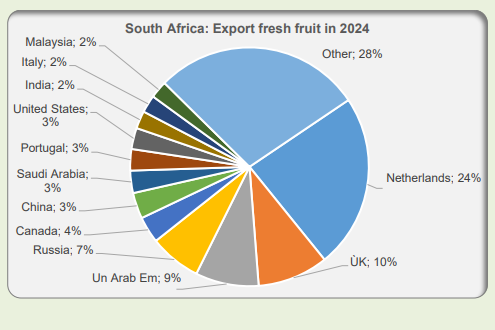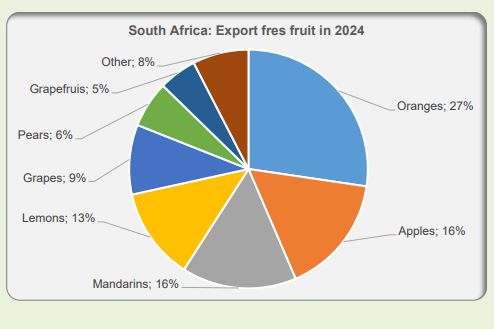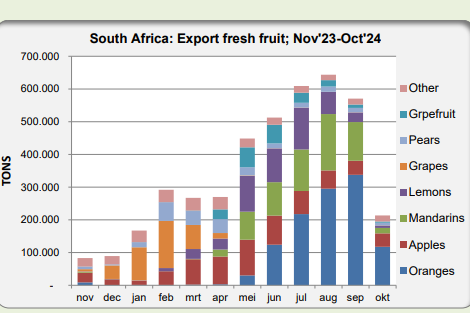Fruit exports from South Africa have seen a slight recovery this year after declining in 2023. At 4.17 million tons, exports this year are 2% higher than in 2023 but still 2% lower than the record of 4.25 million tons in 2022.
A third of South Africa’s fruit exports are directed to the EU27, with the Netherlands being the most important buyer by far. Exports to the EU and the Netherlands will reach record levels this year. Figures through October, when more than 95% of the annual total is typically realized, show that 985,000 tons of South African fruit have been exported to the Netherlands this year.
Record exports to the Netherlands
The Netherlands is by far the most important buyer of South African fruit. In 2024, as noted, 985,000 tons were exported compared to 928,000 tons last year and 945,000 tons in 2022. In 2019, the figure was 642,000 tons. A quarter of South Africa’s total fruit exports go to the Netherlands. The UK is the second-largest buyer, albeit at a distance, with 400,000 tons in 2024. This figure is almost the same as in 2023 but less than in previous years. The United Arab Emirates and Russia follow, with exports of 357,000 and 292,000 tons, respectively. While exports to the Emirates were slightly lower than in 2023, exports to Russia reached a record high.
Canada follows with record exports in 2024 of 150,000 tons. Exports to China, however, fell sharply. Exports to Saudi Arabia showed a partial recovery in 2024, reaching 126,000 tons. Exports to Portugal fell slightly to 121,000 tons, followed by the United States with 119,000 tons and India with 100,000 tons.

Significant exports to Southeast Asia
By region, the EU27 remains the most important destination, with 1.4 million tons exported in 2024—one-third of the total and a record figure. In 2019, this figure was less than one million tons. Southeast Asia narrowly ranked as the second-largest sales region, but exports in 2024 fell by 6% to 665,000 tons. By contrast, exports to the Middle East grew to a record 662,000 tons.
Oranges dominate but exports decline
Oranges remain South Africa’s most important fruit export. However, exports have declined from nearly 1.3 million tons in 2020 and 2021 to 1.14 million tons in 2024. Apples are the second-largest product, with 676,000 tons exported in 2024—over 10% more than in 2023. Few South African apples are sent to the Netherlands, with less than 30,000 tons in 2024. The UK is the leading market, importing nearly 80,000 tons, followed by the Emirates with 43,000 tons, and then India, Bangladesh, and Nigeria.
Mandarins rank third and are experiencing significant growth. Nearly 650,000 tons will have been exported in 2024. Lemons follow, with exports of 520,000 tons in 2024, which is smaller than in previous years. South African grape exports grew sharply after the dip in 2023 but still lagged behind 2022 figures. Other growing export products include avocados, blueberries, and mangoes.


70% avocados go to the Netherlands
Of all South African avocado exports, 70% are destined for the Netherlands. Other products with a high proportion of exports to the Netherlands include grapes (50% of the total), plums and apricots (45%), and peaches and kiwis (35%).
Peak export season from May to September
Between May and September, South Africa exports over 400,000 tons of fresh fruit every month, peaking at more than 600,000 tons in July and August.
In May, exports mainly consist of apples, lemons, and grapefruits. Large volumes of tangerines are also exported during this period. In June, the orange season begins and continues into October. Grapes dominate exports in January and February.
More than two-thirds of exports via Cape Town
The majority of exports to major buyers go through Cape Town. Of the 4.2 million tons of fresh fruit exported by South Africa in 2024, 2.88 million tons were shipped via Cape Town. This is followed by Port Elizabeth with 0.53 million tons and Durban with 0.45 million tons. Eighty percent of exports to the Netherlands and 90% to the UK are shipped via Cape Town. Half of the exports to the Emirates also go through Cape Town.
For more information:
Jan Kees Boon
Fruit and Vegetable Facts
fruitvegfacts@gmail.com
www.fruitandvegetablefacts.com


